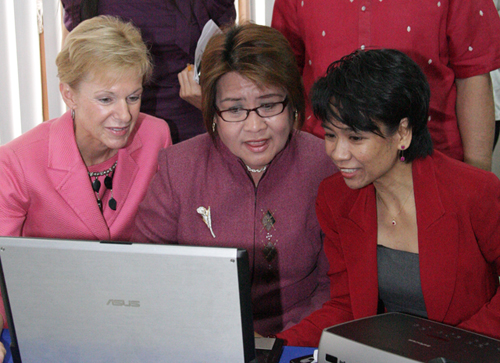Political prisoner Leila de Lima—former senator, justice secretary, and chairperson of the Commission on Human Rights—analyzes the Filipinos’ political culture during her interview with Pressenza journalist Perfecto Caparas. She ended up behind bars after earning the ire of former president Rodrigo Duterte for initiating and leading a senate investigation into the so-called “war on drugs” that resulted in the murder of 12,000-30,000 civilians, according to the International Criminal Court’s Office of the Prosecutor.
“And now, with the advent of red-tagging of activists, human rights defenders, and civil society organizations that are active in calling out government abuses, there is an even greater disincentive to participating in political governance.”
Perfecto Caparas (PC): How do you analyze the political consciousness and political culture of the Filipino people?
Leila M. de Lima (LDL): Political consciousness is defined as a person’s political sense of self and awareness of his/her place in the power structure in the society in which he/she lives.
Our Constitution defines our government as a democratic and republican state. Art. II, Sec. 1 further provides that sovereignty resides in the people and all government authority emanates from them.
Democracy means our leaders are elected in a free and fair electoral process. And republican means that our government functions through our elected representatives.
It is my understanding that our people’s political consciousness stems from a basic understanding of a republican democracy. Our people know that their vote determines who our elected leaders are, and at the same time, many take it as a given that their influence is reduced to practically nothing once the elected leaders assume office.
This means that for many, if not most of our citizens, their participation in governance begins and ends with the elections.
Unfortunately, also, this means that since many citizens do not intend to participate in governance and have no intention of holding the elected officials accountable, they base their votes on considerations other than good and lasting governance.
PC: What are their strengths and weaknesses with respect to political governance?
LDL: There is a certain level of engagement for Filipinos near and around the time of the elections. In any democracy, participation is almost always considered a positive thing.
However, in terms of political governance, there is some reason for concern because few voters hold their elected officials accountable. Most of the citizenry do not have the wherewithal to assert their rights and demand accountability from abusive and incompetent leaders. And now, with the advent of red-tagging of activists, human rights defenders, and civil society organizations that are active in calling out government abuses, there is an even greater disincentive to participating in political governance.
PC: What are the factors and conditions that give rise to the people’s political strengths and weaknesses?
LDL: Education. Many of our countrymen do not know how the government works. During elections, many do not exert effort in knowing who and what the qualifications and platforms of the candidates are. They just rely on popularity and endorsements. In many instances, they simply just re-elect the incumbent officials without considering other options.
Many people do not also understand how to hold officials accountable. They think that criticisms against official actions and policies, and even against corrupt practices are just nuisances, or worse, acts of treason.
History. Our people have been subjugated for far too long, first by foreign rulers, then by local political clans, that we have treated our elected officials as some kind of royalty that must be obeyed without question. This kind of thinking not only perpetuates abuse by the officials of our people but destroys the very foundation of our democracy.
Culture. In many local communities, critical thinking is frowned upon if not outrightly rejected. These include families, organizations and religious communities who require subservience without question from their members. This value or mindset absolutely runs counter to democratic principles. A strong democracy requires critical thinking and participative citizens.
Economics. Poverty is seen as a barrier to effective citizen participation. In many places, citizens would rather sell their votes instead of pursuing a critical decision-making process. Our poorer brethren also have limited access to education that would enable them to become better and more participative citizens.
Post-truth Media. The current media landscape, especially social media, is so replete with misinformation and disinformation that serves political interests. Most traditional media lack the guts, drive, and institutional capability to dwell on sensitive political and social issues. This prevents people from effective and incisive understanding of national issues and getting proper feedback in their activities as citizens.
PC: In what areas of political life and culture do the Filipino people need to be aware of and strive for further development? How can the people move towards that direction?
LDL: Our people must have a deeper understanding of how our government works, what functions each office performs, and how important are checks and balances in our country. This must be highlighted in our curriculum in schools and in our information campaigns.
Part of the education campaign should include opportunities in which citizens can participate in governance. Our people must understand that our duties as citizens do not end after the elections. It is our duty to be vigilant and hold our officials accountable to the people.
We also need to promote critical thinking among our citizens and teach them how to question policies and information wherever they receive them.
The key to elevating our democracy is having capable citizens who are not so easily swayed by political interests that do not serve the greater interests of our country.
LEILA M. DE LIMA
05 November 2022










